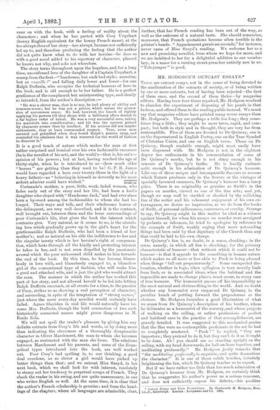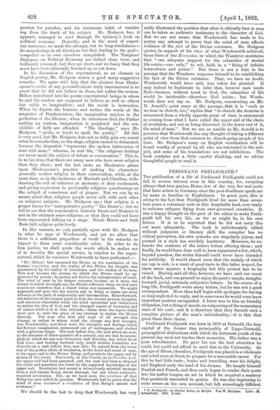MR. HODGSON'S OUTCAST ESSAYS.* THESE are outcast essays, not in
the sense of being devoted to the amelioration of the outcasts of society, or of being written by one or more outcasts, but of having been rejected—the first of them once, and the second of them thrice—by magazine editors. Having been four times repulsed, Mr. Hodgson resolved to abandon the experiment of disposing of his pearls in that fashion, and offered them to the reading public instead. We must say that magazine editors have printed many worse essays than Mr. Hodgson's. They are perhaps a trifle too long ; they some- times drag a little ; they might be more terse, rapid, and com- pact; but both in style and in thought, they are very far from contemptible. Five of them are devoted to De Quincey, one is on the Supernatural in English Poetry, one on the True Symbol of Christian Union, and one on English verse. Those on De Quincey, though readable enough, might most easily have been dispensed with. Mr. Hodgson is not in the slightest degree too enthusiastic in his commendation of some of De Quincey's merits, but he is not sharp enough in his censure of De Quincey's faults. He is hardly enthusi- astic enough in his admiration of De Quincey's humour. Like one of those unique and incomparable flavours or aromas. which Nature produces only in the flowers or the vintages of specially favoured summers, De Quincey's humour has a fancy price. There is an originality as genuine as Swift's in the papers on murder, viewed as one of the fine arts ; and yet, though we may well be startled or shocked by the rollicking fun of the writer and his vehement enjoyment of his own ex- travagance, we derive no impression, as we do from the books of Swift, of personal callousness, coarseness, or cruelty. Strange to say, De Quincey might in this matter be cited as a witness against himself, for when his essays on murder were arraigned by pedants as inhuman, he tried to apologise by reference to the example of Swift, weakly urging that more astounding things had been said by that dignitary of the Church than any that could be laid to his own charge.
De Quincey's fun is, no doubt, in a sense, shocking; in the sense, namely, in which all fun is shocking; for the primary characteristic of humour—that without which it could not be humour—is that it appeals to the something in human nature which makes us all more or less akin to Puck in being pleased when things "fall out preposterously." Some unexpected dis- location, whether in logic, when syllogism is torn merrily limb from limb, or in associated ideas, when the habitual and the impossible are made to change places, must occur, in every case of true humour. The humourist passes off his impossibility as the most natural and obvious thing in the world. And we doubt whether any humourist ever surpassed De Quincey in the peculiar knack of putting forward the preposterous as the obvious. Mr. Hodgson furnishes a good illustration of what we mean from De Quincey's description of his brother, whom he delineates as a humourist of the nursery, and whose projects of walking on the ceiling, or rather professions of perfect and habitual ease in the practice of that accomplishment, are gravely detailed. It was suggested to this mechanical genius that the flies were no contemptible proficients in the art he had so completely mastered. "Pooh ! " he replied, " they are impostors ; they pretend to do it, but they can't do it as it ought to be done. Ah ! you should see me standing upright on the ceiling, with my head downwards, for half-an-hour together, and meditating profoundly." Mr. Hodgson justly remarks that "the meditaling profoundly is exquisite, and quite dramatises the character." It is one of those subtle touches, infinitely heightening the fun, which De Quincey teaches us to expect.
But if we have rather too little than too much admiration of De Quincey's humour from Mr. Hodgson, we certainly think that he exaggerates his author's power as a serious reasoner, and does not sufficiently expose his defects,—his positive
• Outcast Essays and Verse Translations. By Shadworth H. Hodgson, lion. LL.D., Edinburgh. London; Losgmans and Co. 1881.
passion for paradox, and his inveterate habit of wander- ing from the track of his subject. Mr. Hodgson has, it appears, managed to read through De Quincey's book on political economy. Honestly, and in the mood of expect- ant reverence, we made the attempt, but its long-windedness— its meanderings in all directions but that leading to the goal— compelled us to own ourselves vanquished. The Templars' Dialogues on Political Economy are indeed clear, terse, and brilliantly reasoned ; but they are short, and we fancy that they must have been editorially brushed up or cut down.
In his discussion of the supernatural, as an element in English poetry, Mr. Hodgson makes a good many suggestive remarks. We agree with him that the absence from Shake- speare's works of any personifications truly supernatural is no proof that he did not believe in them, but rather the reverse. Milton introduced into his poems supernatural beings in whom he and his readers are supposed to believe, as well as others due solely to imagination ; and the result is instructive. When he depicts the features and recites the words of the magnates of Pandemonium, the imagination rejoices in the perfection of the illusion ; when he introduces God the Father making an oration, imagination is perplexed and the sen- sibilities of faith are offended. "The theology," says Mr. Hodgson, "spoils, or tends to spoil, the poetry." All this is very good, but Mr. Hodgson does not so fully gain our assent when he remarks that, on the stage, religion cannot be delineated, because the dramatist "represents the spoken intercourse of man with man ;" whereas, in real life, "the religious feelings are never made the subject of debate or conversation." This is, in so far, true, that there are many men who have more religion than they show ; and the fact casts an illustrative gleam upon Shakespeare's practice of making his characters generally eschew religion in their conversation, while, at the same time, as in the instances of Macbeth and Claudius, with- drawing the veil of reticence at moments of deep excitement, and giving expression to profoundly religions questionings on the subject of conscience and of prayer. But we can by no means admit that religious people never talk with each other on religious subjects. Mr. Hodgson says that religion is a proper theme for "interpretative poetry" like Dante's ; but we fail to see that the conversation between Dante and Beatrice is not in the strictest sense religious, or that they could not have been represented talking on a stage. Dinah Morris and Seth Bede talk religion quite freely.
In like manner, we only partially agree with Mr. Hodgson in what he says of Wordsworth, and yet we allow that there is a sufficient proportion of truth in his remarks to impart to them some considerable value. In order to do him justice, we shall quote the words which he makes use of to describe the special service, in relation to the super- natnral, which he conceives Wordsworth to have performed :—
" He [Milton] had imagined the Divine as the correlative of the human conscience, and the reality of the Divine for thought was guaranteed by the reality of conscience and the reality of its laws. This now became the avenue by which the Divine could be ap- proached by poetry; by poetry not fictive, but interpretative of truth. The mind of man in its deeper recesses became, as it were, the mirror in which we might see the Divine reflected, when we had once convinced ourselves that a direct vision was impossible. We might approach and gaze into the mirror, and in doing so make one more advance in the path of subjectivity and introspection. Henceforward, the relations of the human mind to God, the mental powers, thoughts, and emotions observable while the mind entertains and endeavours to realise the idea of God, and the changed aspect of humanity and of nature while it is in that attitude,—these were the topics which were now to take the place of any attempt to realise the Divine directly. The man who first and most of all wrought this change, or rather in whose mind the change was first wrought, was Wordsworth ; and these were the thoughts and feelings which his fervent imagination summoned out of nothingness, and clothed with a glorious shape. The task before him, the task which we now, at the distance of three-quarters of a century, can see that he accom- plished, which we can now formulate and describe, but which he at that time, and looking forward only, could neither formulate nor describe as a task before him, was this : To ascend from the lower end of the golden chain of revelation, in the heart and mind of man, to its upper end in the Divine Being, and ascertain the upper end by means of the lower. Previously, in the Creeds, as in Paradise Lost, the upper end had been assumed, and the task had been to descend the chain and ascertain the lower by the supposed knowledge of the upper end. Revelation had meant a miraculously attested message from a well-known Being, whose message, but not whose existence, required attestation. But, as we have seen, the existence of that Being was now called in question. Wordsworth had to prove that the mind of man contained a revelation of that Being's nature and existence."
We should be the last to deny that Wordsworth has very nobly illustrated the position that what is ethically best in man can be taken as authentic testimony to the character of God. But we are not aware that Wordsworth has made in his poetry any attempt to prove that the mind of man affords evidence of the fact of the Divine existence. Mr. Hodgson quotes, in support of his view of what Wordsworth achieved, those lines of the Excursion in which the Wanderer maintains that "one adequate support for the calamities of mortal life exists,—one only," to wit, faith in a "Being of infinite benevolence and power." But there is not a hint in the passage that the Wanderer supposes himself to be establishing the fact of the Divine existence. That, we have no doubt, Wordsworth would have said, was taken for granted. It may indeed be legitimate to infer that, because man needs God—because, without trust in God, the calamities of life would be intolerable—therefore God exists ; but Words- worth does not say so. Mr. Hodgson, commenting on Mr. M. Arnold's quiet sneer at the passage, that it is "such as we hear in church, too," replies that "in church the doctrine is announced from a wholly opposite point of view, is announced as coming from what I have called the upper end of the chain of revelation, and not as being discerned in the lower end of it, the mind of man." But we are as unable as Mr. Arnold is to perceive that Wordsworth has any thought of taking a different point of view from that common to church-going people of his time. Mr. Hodgson's essay on English versification will be found worthy of perusal by all who are interested in the sub- ject, and some of his translations are not infelicitous. The book contains not a little careful thinking, and we advise thoughtful people to read it.















































 Previous page
Previous page